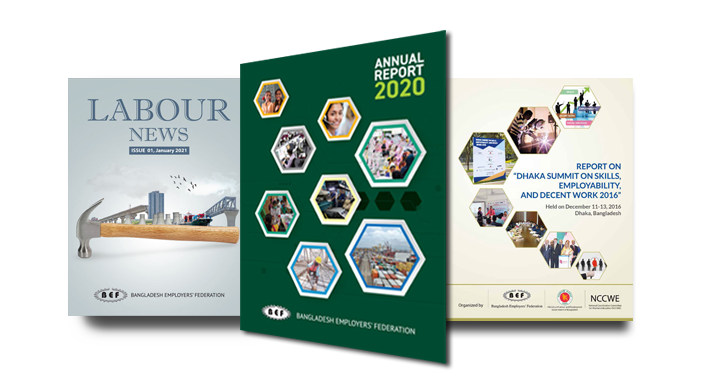CONTEXT:
The Labour Law and Regulatory Affairs Cell (LLRAC) was established by the Bangladesh Employers Federation (BEF) in response to the growing complexities and challenges presented by labor laws and regulations in Bangladesh. As the country’s economy continues to evolve and expand, there has been increasing pressure on employers to comply with a wide array of labor laws, including those governing working conditions, wages, employee rights, and workplace safety. The establishment of LLRAC aims to create a structured support system for employers, providing them with necessary resources, advocacy, and guidance to effectively manage labor law compliance and navigate the regulatory landscape. Given the growth of the industrial sector and the proliferation of labor laws, the need for a dedicated body that focuses specifically on labor regulatory matters became paramount.
The Labour Law and Regulatory Affairs Cell (LLRAC) of the Bangladesh Employers Federation (BEF) serves as a vital resource for employers navigating the complexities of labor laws and regulatory frameworks in Bangladesh. Established to advocate for employers’ interests, LLRAC ensures that businesses remain compliant with existing labor regulations while fostering a fair and conducive work environment. The LLRAC stands as a crucial link between employers and regulatory authorities, helping facilitate a balanced approach to labor regulations that supports both employer interests and employee rights.
The Labour Law and Regulatory Affairs Cell (LLRAC) operates under the Bangladesh Employers Federation (BEF), aiming to support and advocate for the interests of employers in relation to labor laws and regulatory matters. Recognizing the complexities of labor legislation and the dynamic nature of the regulatory environment, LLRAC plays a pivotal role in guiding businesses in Bangladesh to navigate compliance while promoting a positive relationship between employers and employees.
The LLRAC serves as a critical resource for employers in Bangladesh, particularly in a rapidly evolving regulatory landscape. By equipping members with the tools and knowledge necessary to comply with labor laws, the Cell promotes a fair and sustainable labor market that benefits both employers and employees. Its proactive approach helps foster a business climate that encourages investment, growth, and workforce development, ultimately contributing to the overall economic progress of Bangladesh. In summary, the Labour Law and Regulatory Affairs Cell stands as an essential entity in safeguarding the interests of employers while ensuring adherence to labor regulations, thereby playing a significant role in enhancing workplace dynamics and promoting a balanced approach to labor relations.
WHY WE EXIST:
- Complexity of Labor Laws: The labor laws in Bangladesh are intricate and span multiple areas, including rights of workers, industrial relations, and occupational safety. Employers often face challenges in interpreting and applying these laws appropriately. LLRAC serves as a knowledgeable entity that clarifies legal requirements and assists employers in maintaining compliance.
- Support for Employers: Many employers, especially small and medium-sized enterprises (SMEs), struggle to keep up with changing regulations due to limited resources and expertise. The LLRAC provides tailored support and resources to help these businesses operate within the legal framework, thus fostering an environment where they can thrive.
- Advocacy and Representation: Employers in Bangladesh often lack a platform to voice their concerns regarding labor policies and regulations. The LLRAC serves as a representative body that advocates for the interests of employers at national and local levels, working to ensure that their perspectives are considered in labor policy formulation.
- Promoting Fair Labor Practices: By providing guidance on regulatory compliance, LLRAC aims to promote fair and ethical labor practices among employers. This approach not only helps in adhering to the legal standards but also enhances the overall workplace environment, leading to increased productivity and employee satisfaction.
- Conflict Prevention and Resolution: The LLRAC recognizes that labor disputes can be detrimental to both employers and employees. By facilitating clear communication and understanding of labor laws, the Cell aims to minimize conflicts and provide mechanisms for amicable resolution when disputes arise.
- Training and Capacity Building: With a focus on continuous learning, the LLRAC conducts training workshops aimed at enhancing employers’ understanding and implementation of labor laws. By equipping employers with the right knowledge and skills, the Cell helps build a more competent and compliant workforce.
- Impact on Economic Growth: A compliant and well-managed labor market is critical to the economic development of Bangladesh. By ensuring employers meet their regulatory obligations, the LLRAC contributes not only to the stability of individual businesses but also to the overall economic health of the country.
OUR VISION: To be the leading authority and resource for employers in Bangladesh on labor law compliance and regulatory affairs, contributing to a balanced and progressive labor environment that encourages industrial harmony, productivity, and sustainable economic development.
OUR MISSION: To provide comprehensive support, guidance, and advocacy for employers in adhering to labor laws and regulations in Bangladesh, ensuring compliance, promoting fair labor practices, and fostering a conducive work environment that drives economic growth and stability.
OUR: GOALS:
- Enhance Compliance: To facilitate and ensure compliance with all relevant labor laws and regulations among employers in Bangladesh.
- Advocate for Employers: To represent and advocate for the interests of employers in labor law discussions and policy-making processes at national and local levels.
- Educate and Train: To provide continuous education, training, and resources to employers regarding labor laws, best practices, and compliance strategies.
- Resolve Conflicts: To promote amicable resolution of labor disputes and establish mechanisms to prevent conflicts between employers and employees.
- Promote Best Practices: To encourage fair labor standards and ethical practices among employers, fostering a culture of respect and inclusivity in the workplace.
OUR OBJECTIVES:
- Legal Guidance: Offer expert legal resources and consultations on labor law compliance to employers. Keep employers informed about changes in labor laws and regulations.
- Capacity Building: Organize regular training workshops and seminars for employers focusing on labor law compliance and human resource management. Develop training materials and guides to promote understanding of labor regulations.
- Awareness Campaigns: Conduct awareness campaigns to educate employers about their rights and obligations under labor laws. Promote the importance of compliance among employers through newsletters, publications, and online resources.
- Policy Advocacy: Engage in discussions with relevant government bodies to influence labor policy making that recognizes the challenges and needs of employers. Create a forum for employers to share their insights and concerns regarding labor regulations.
- Dispute Resolution Services: Establish a mediation and arbitration framework to assist employers and employees in resolving disputes amicably. Provide guidance on best practices for handling conflicts in the workplace.
- Research and Development: Conduct research on labor market trends and regulatory impacts on employers to inform policy recommendations. Share findings and insights with stakeholders to promote continuous improvement in labor laws and employer-employee relations.
- Networking Opportunities: Facilitate networking opportunities among employers to foster collaboration and knowledge sharing regarding labor law compliance and best practices.
OUR TARGET AUDIENCE: Employers across various sectors in Bangladesh
OUR MAJOR ACTIVITIES:
- Advisory Services: The Cell provides expert guidance on labor law issues, helping employers address challenges related to workplace regulations, employee rights, and dispute resolution.
- Policy Advocacy: The Cell represents the interests of employers in consultations with government bodies and other stakeholders, working to shape labor policies that promote economic growth and competitiveness.
- Training and Capacity Building: LLRAC organizes workshops, seminars, and training programs aimed at enhancing awareness and understanding of labor laws among employers and HR professionals.
- Research and Analysis: Conducts research on current labor market trends and the impact of regulatory frameworks, disseminating findings to help employers make informed decisions.
- Compliance Monitoring: LLRAC engages in the ongoing assessment of labor-related legislative changes and advises member organizations on necessary adaptations to policies and practices to ensure legal compliance.
- Support in Conflict Resolution: Assists member organizations in handling labor disputes and grievances, promoting constructive dialogue between employers and employees.
OUR WHATSAPP NUMBER:
- Muhammad Habibur Rahman, Asst. Secretary-General, BEF NO. 01711204613
- Mahabur Rahman, Legal Officer, BEF NO. 01774882816
OUR FACEBOOK PAGE:
- Labour Law & Regulatory Affairs Cell of BEF https://www.facebook.com/profile.php?id=61575609308293
OUR LINKEDIN PAGE:
- Labour Law & Regulatory Affairs Cell of BEF
https://www.linkedin.com/company/108411193/admin/dashboard/
OUR EMAIL ADDRESS: bef.legalcell@gmail.com
OUR WEBSITE: www.bef.org.bd
CONCLUSION: The Labour Law and Regulatory Affairs Cell of the Bangladesh Employers Federation is a vital institution for supporting employers in understanding and complying with labor laws. Through its various functions—legal guidance, advocacy, training, and conflict resolution—LLRAC plays a crucial role in promoting a balanced labor environment that benefits both employers and employees. This alignment is essential for fostering sustainable economic growth and improving industrial relations in Bangladesh.



